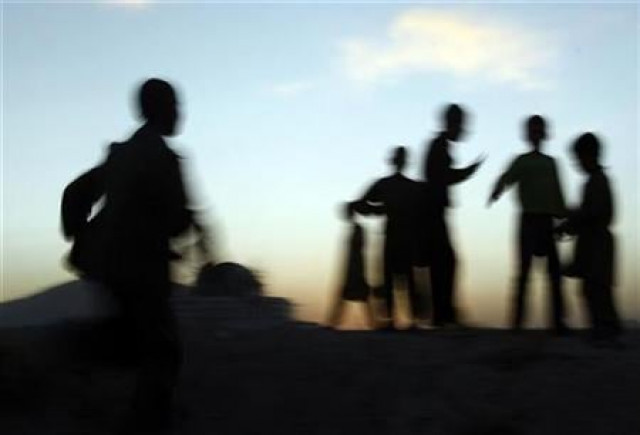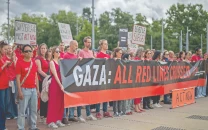545 children killed in Afghan conflict last year: UN report
War leaves children scarred physically and psychologically: Secretary-General’s Special Representative for Afghanistan

File photo of Afghan children playing. PHOTO: REUTERS/FILE
The United Nations Assistance Mission in Afghanistan (Unama) launched a booklet highlighting the complementarity between the teachings of Islam with international human rights and international humanitarian law.
Improvised explosive devices (IEDs), which are the biggest killers of civilians in Afghanistan, were the leading case of death in children.
“The conflict has exposed children to armed groups that prey on their vulnerability and exploit them, and who use children to participate in active hostilities or as messengers and delivery boys – further exposing children to the dangers of war,” said the Secretary-General’s Special Representative for Afghanistan and head of Unama, Ján Kubiš, at the launch, revealed Unama’s website said.
“War destroys the lives of children. It leaves them scarred physically and psychologically,” he added. “It truly shocks me when I meet children in this county who have known nothing but war and violence.”
The conflict in Afghanistan has left children dead and injured, and many have lost their limbs.
[infogram url="" height="140"]
[infogram url="" height="140"]
[infogram url="" height="220"]
The conflict has also often denied children basic human rights such as access to education and adequate healthcare, and has impeded even the most basic economic development, fuelling poverty and further vulnerability of children.
The chairperson of the Independent Human Rights Commission of Afghanistan (IHRC), Seema Samar, says around 284 children have been killed as a result of a surge in violence across the country this year.
She also criticised the Taliban for misuse of children, specifically in armed conflicts, and called on all parties involved in Afghanistan’s conflict to respect the human rights of children.
The Taliban have rejected these claims and the group’s spokesperson, Zabihullah Mujahid, says that Taliban as per the leadership’s instructions “do not recruit children for fighting.”
The report is focused on the six grave violations of child rights in armed conflict, namely: the killing and maiming of children; recruitment, use and association of children with armed forces and armed groups; the abduction of children; attacks against schools and hospitals; rape and other forms of sexual violence against children; and the denial of access to humanitarian assistance.
The booklet examines each violation under Sharia law, international human rights law, international humanitarian law and the national laws of Afghanistan.
The booklet, entitled ‘Protecting Afghanistan’s Children in Armed Conflict,’ is the result of a series of discussions and collaboration between Unama and respected Afghan religious leaders, scholars and experts representing different religious and academic institutions.
“The booklet will serve as a resource and advocacy tool for all child protection partners and promote dialogue on critical and sensitive issues,” said Kubiš.
The spokesperson for Afghan intelligence, Lotfullah Mashal, said around 80% of the suicide attacks are carried out by children in Afghanistan.



















COMMENTS
Comments are moderated and generally will be posted if they are on-topic and not abusive.
For more information, please see our Comments FAQ